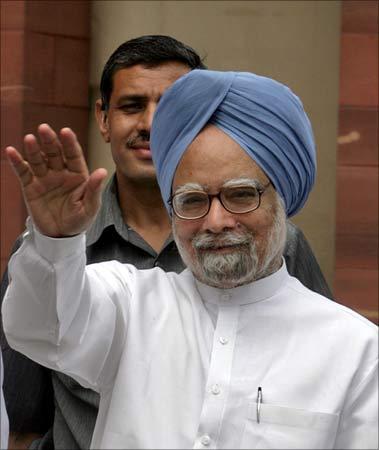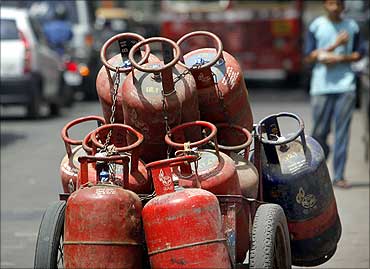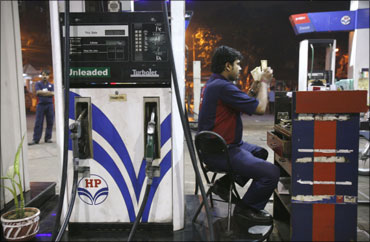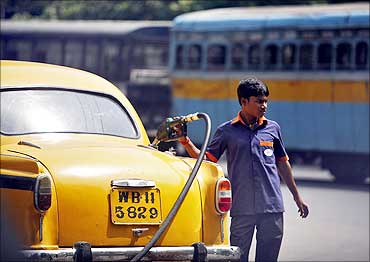
Prime Minister Manmohan Singh on Tuesday said that diesel prices too will be freed from government control as part of 'much-needed reforms', but LPG and kerosene will continue to be subsidised.
He also rejected the Opposition criticism of last week's decision to hike fuel prices, which saw petrol prices being pegged to market rate.
"The fact that petrol prices have been set free, the same is going to be done to the diesel prices. (These are) much-needed reforms," he told journalists accompanying him on his way back home from Toronto where he attended the G-20 Summit.
The government on June 25 decontrolled petrol prices, resulting in a Rs 3.50 a litre increase in rates in Delhi, and raised diesel prices by Rs 2 a litre in preparation for an eventual decontrol. Diesel rates, at current prices, will rise by another Rs 1.50 if it is freed from government control.
The prime minister did not say by when the diesel prices will be decontrolled, but said domestic cooking gas and kerosene prices will continue to be regulated by the government.
. . .

Last week, domestic LPG prices were hiked by Rs 35 per cylinder and kerosene rates went up by Rs 3 per litre, the first increase in the poor man's cooking fuel in more than 8 years, as part of a move to cut government's subsidy bill.
Even after the hike, kerosene is being sold at Rs 15.07 per litre below cost, while a 14.2-kg LPG cylinder is under priced by Rs 226.90.
"And the adjustment that has been made in the prices of kerosene and LPG was also necessary, considering the very high amount of subsidy that is implicit in their pricing structure," he said.
The prime minister was replying to a question on the government's decision on Friday to effect an increase in the prices of petroleum products to cut losses for oil marketing companies and whether it indicated that the government was getting ready for tougher reforms and further deregulations.
"Well I can't tell you what we are going to do next. I think that when things get crystallised in the government system you will know them," he said.
. . .

The prime minister said the government had taken due care to ensure that the poorer sections were affected to the least possible extent and that was why the attempt to keep under regulation the prices of kerosene and LPG.
The hike in fuel prices was necessitated because of the rising gulf between the cost of production and the retail prices.
Without the increase, public sector oil firms were projected to lose Rs 74,300 crore (Rs 743 billion) in revenues in 2010-11 fiscal and after the hikes, they will be saddled with Rs 53,000 crore (Rs 530 billion) of losses.
Also, the government has reserved the option of intervention in case of excessive rise or volatility in global oil prices, which are to decide auto fuel prices now.
Asked about the opposition to the fuel price hike and reservations even among the allies, Singh said that he had read about the intentions of the Opposition and had not talked to anyone in the political establishment.
. . .

"What I am considering is that what we have done by way of adjusting the petroleum prices is that people of India would appreciate the compulsions, which have compelled us to undertake this measure.
"And our people are wise enough to understand that excessive populism should not be allowed to derail the progress our country is making and for which it is winning kudos internationally as well," Singh said.
He also dismissed suggestions that the decision on petroleum prices was taken under pressure from some countries.
"There is no pressure on the Government of India from any quarter. What we need is to do the right things by our country. The subsidies for the petroleum products have reached a level which is not connected to sound financial management of our economy.
"So, it is taking this into account that this decision has been taken to put some burden on the common people, but I think it is manageable," the prime minister said.